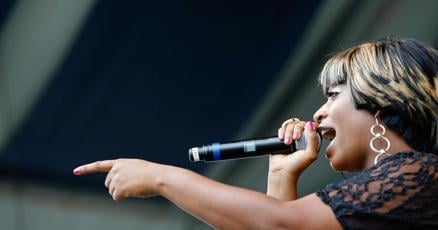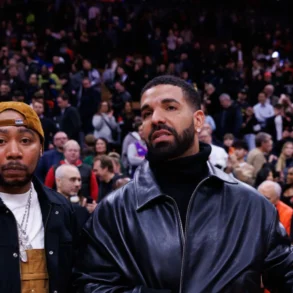Trishell “Ms. Tee” Williams started performing as a young teenager, sneaking into New Orleans clubs in the early ’90s with fellow bounce artist Cheeky Blakk. Quickly, though, Ms. Tee’s voice caught the attention of Ronald “Slim” Williams and Bryan “Baby” Williams, and she became the first female artist signed to Cash Money Records at just 14 years old.
Ms. Tee blended an R&B vocal style with rap and bounce, and her releases on Cash Money, including the albums “Having Thangs” and “Female Balla,” took off in New Orleans and across the South. In the late-’90s, Ms. Tee parted ways with Cash Money and released her third album, “That’s a Hot Girl,” in 1997, and continued to score memorable hits, like the 1999 single “Why You Acting Funny” with Partners-N-Crime.
Today, Ms. Tee has seven albums and EPs in her catalogue, and she’s also written two books, the memoir “I Am Stronger and Wiser Now,” which is accompanied by an album, and “Morning Affirmations and Inspiration for the Soul.” Find more about her at legendarymstee.com.
This interview is part of a series reflecting on New Orleans’ role in hip-hop as it turns 50.
Gambit: What was your introduction to hip-hop?
Ms. Tee: The song that really got me into wanting to do New Orleans music — I had DJ Jimi’s whole album (“It’s Jimi”) and “Where They At” just blew me away. Because at this time, I was a young girl, but I was sneaking in the clubs, right? So I was hearing the new bounce sounds that they had. I think Mia X was on at that time, DJ Jimi, Ruthless Juveniles, Females in Charge, Silky Slim, Ju’C “Eat the Cat.” Gregory D was maybe the biggest one at that time. It was him and Mannie Fresh, and they had a song called “Buck Jump Time.” So that music really, really influenced me.
But let me tell you what happened. So me and Cheeky (Blakk) met when I was going to Bell (Junior High School), but she was in a higher grade than me. She was in the 9th or the 10th and I was in the 7th or the 8th or something like that. And we had got cool and we stayed right around the corner from each other, so we was like, “You know what girl? Let’s do this music.”
I named myself Terrible Tee — it wasn’t Ms. Tee yet — and Cheeky picked Cheeky Blakk. What we used to do, one of the people who used to manage Cheeky was Bobby Marchan, so she’d go to these gong shows (hosted by Marchan), where if you sound bad, they’d hit the thing — “dong!” — and you gotta get off stage. Like at the Apollo (Theater), they used to have that in New Orleans back in the ’90s. They had one showcase that was at Big Easy. We didn’t have a group name — we were Terrible Tee and Cheeky Blakk, but we called ourselves a group.
So we’re in there and we’re performing, and Cheeky’s name fit her: Cheeky Fucking Blakk. She didn’t give up the mic. When I got off stage, “Slim” (Ronald Williams) gave me a card and said, “I like your voice. Give me a call.” At this time, they thought I was a grown woman, that I was 18, but I was like 14 years old and snuck into the club.
But I didn’t call him right then and there because I was rolling with Cheeky. We used to be in the club, and the club scene was really popping. You had the Big Easy, you had Rumors, you had Club 49, Club Sensations, Club Detour Uptown. All these different clubs we used to be rapping and performing and stuff.
I remember, I was staying by my aunt, she was a registered nurse, her name was Linda, she bought me DJ Jimi’s cassette tape. I just started listening to it, and it really inspired me to want to get into bounce music. I was rapping hard. I was like Da Brat. I was rapping like I was a gangster. And once I met Cash Money, “Baby” (Bryan Williams) was like, “I think I wanna name you Ms. Tee.” He’s the one who gave me the name. I was calling myself Terrible Tee because I was trying to be hard, but they knew I had this soft R&B sound. They also knew I could rap, so Baby was like, “Why don’t you mix that together.”
So Slim gave me the card, but I waited about six months. What really made me call him was listening to DJ Jimi. His whole album was off the chain! I love that album.
[embedded content]
Gambit: What was it about what Jimi was doing or that sound that really attracted you?
Ms. Tee: It was our sound. When I was younger, hip-hop was heavily in New York. So at this time, we didn’t really have anything. Then all the different artists start popping up. Listening to DJ Jimi kinda influenced me that you could do this, too. Then he had Juvenile on there. That whole CD, I promise ya, it gave me my life. When I tell you that was my favorite album!
Then, I used to hear Ju’C, and they were cool. Mia X, she was a little bit more lyrical, and she used to come out and like preach at first, talking about standing up for women and stuff like that, so that got me interested, too. But that DJ Jimi album led me to call Cash Money.
[Cash Money] had another artist named Pimp Daddy (Edgar Givens), and me and him, we kind of did some of the same [styles], so they kind of paired us together. When they paired us, that’s when my name started to get out because I was paired up with a hot artist that was already hot. Pimp Daddy was hot on Cash Money before I came.
My first time working in the studio was with Pimp Daddy. I was scared, scared, scared because it was my first time recording … It was hard because I was scared. I didn’t know. But after a while, I got comfortable with it.
[embedded content]
Gambit: How did you feel bounce changed over the ’90s as people started to put their own spin on it?
Ms. Tee: I kind of think it changed in the Millennium. 10th Ward Buck had a song called [“Fasta”], that sped the beat up. When it got to the youngsters, they sped the bounce up and they put their own little swing in it. And not saying there’s anything wrong with it — I think that’s good because you have this side of bounce, the old bounce, and you got the new bounce. But what I like is the big celebrities, they like the old bounce, like Beyonce did “Church Girls” (which sampled DJ Jimi). That was the type of music I do.
Gambit: You mentioned some of these early women in New Orleans hip-hop. What was the scene like for women working in bounce in the early ’90s?
Ms. Tee: When I first started, I thought it was fun. I was brought up in music. I was in church choirs. I used to be a dancer. I was a cheerleader. So I was always in entertainment. But it’s different when you just like the music and you’re not worrying about the business. When it’s time for the business, that’s what makes it hard for a female, because you might not get the same [compensation]. You’re doing the same job, but you might not get what the guys are getting.
I have a lot of songs that I can perform that a lot of people like, but they’ll book a [male] artist that’s got one song and pay them $15,000, and I’m struggling to get $1,500 or $2,000. That’s what makes it so hard in the industry, and I dealt with that a lot. That’s the only thing I don’t like when it comes to the business: that women get treated different.
Gambit: What would you tell a younger artist today? What’s something that you’ve learned that you’d want to pass on?
Ms. Tee: I would tell them, if they don’t have the funding or a deal, go get them a job and start paying for their own shit. Don’t fuck with none of these dudes to get on. That’s the worst decision. It’ll fuck up your reputation. They’re gonna lose respect for you, and then they’ll think they can talk to you any type of way.
So my advice to young girls, if you don’t have a deal right now, invest in yourself. Invest in yourself. If you starting off local, just take your time. Get you a little job and start paying for your own stuff.
Gambit: What has been New Orleans’ biggest contribution to hip-hop?
Ms. Tee: Our sound and style and swag. One thing that I like when the Hot Boys came, they just kind of like changed the game. They had everybody wearing white T-shirts. Pull up your solja rag. Everybody wanted to be a hot boy. Even when No Limit did No Limit soldiers, everybody wanted to be a soldier. So we kind of brought flavor, and we brought our own style and our own language to the game.
We brought something fresh, different and new. It was hood. It was ghetto. But it was different. And that’s why Juvie’s still performing to this day, because he had classic records. People still try to mimic his style on “Back that Azz Up.” “You workin’ with some ass, yeah.” I’ve heard a lot of national artists trying to use that same flow. Not the same words, but that same little melody.
We definitely brought a lot to hip-hop. We got Megan Thee Stallion saying she a hot girl. Where she get that from?
This post was originally published on this site be sure to check out more of their content.











